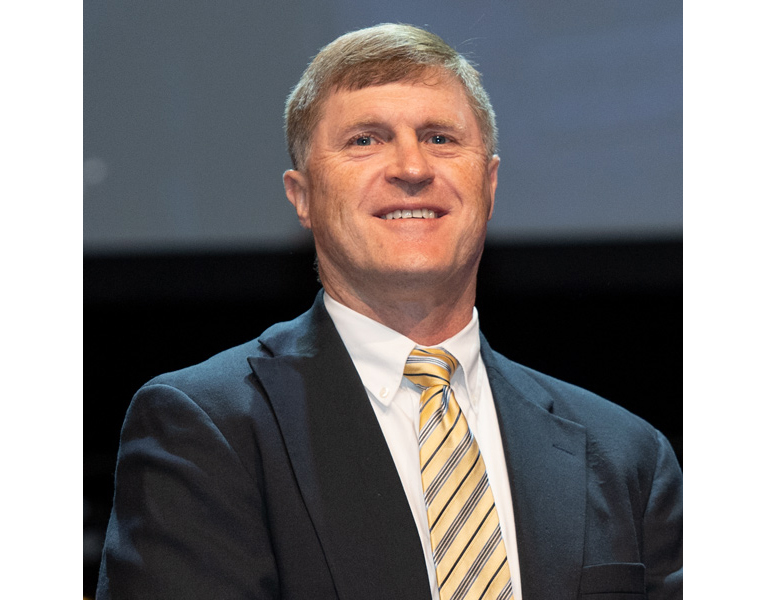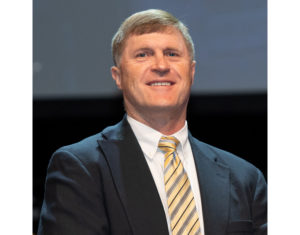
15 Jun School of Allied Health at Cedarville University Names Dean
When Evan Hellwig began his teaching career at Cedarville University, there wasn’t even an athletic training or exercise science class in the course catalog. Now, 34 years, there is an entire School of Allied Health.
 Hellwig, currently chair of the department of kinesiology and allied health, will become the inaugural dean of the newly formed school of allied health, effective July 1. The school will include the recently Higher Learning Commission-approved Master of Athletic Training program and the physician assistant program. Cedarville was notified in March of the M.A.T. program receiving approval from HLC’s Institutional Action Council. Approval from CAATE is still pending.
Hellwig, currently chair of the department of kinesiology and allied health, will become the inaugural dean of the newly formed school of allied health, effective July 1. The school will include the recently Higher Learning Commission-approved Master of Athletic Training program and the physician assistant program. Cedarville was notified in March of the M.A.T. program receiving approval from HLC’s Institutional Action Council. Approval from CAATE is still pending.
The M.A.T. program is slated to begin by 2022, and the PA program is targeting 2023, pending external approvals.
“We put athletic training curriculum in the catalog in 1994; the first graduating class was in 1996, and we were accredited in 2005,” Hellwig said. “Where we are today is beyond my wildest dreams.”
The shift from a department to a school has been facilitated by two significant changes.
First, Cedarville is in the midst of transitioning its Bachelor of Arts in athletic training to a Master of Athletic training (M.A.T.) program, to meet the new Commission on Accreditation of Athletic Training Education (CAATE) requirement of a master’s degree for entry in the field.
The second change has been the initiation of a physician assistant program. “The physician assistant program wasn’t even on the radar two years ago,” Hellwig noted. “It has been remarkable how quickly Cedarville has jumped into supporting the development of this program. The athletic training program has been very successful, especially under (associate professor of athletic training) Mike Weller’s leadership. We’re one of the most respected programs in the state of Ohio.”
The physician assistant program will be led by Jason Grahame, one of Hellwig’s former athletic training students.
“Jason was a very, very good athletic training student,” Hellwig said. “He went on to a physician assistant career where he focused on orthopedics, which is a good fit with athletic training.
“For him to come back to Cedarville with his background and his professional beginnings in athletic training, he understands how well the two allied health professions can interact and collaborate with each other.”
With his three-plus decades on Cedarville’s campus, Hellwig views the recent transformation of his department into the school of allied health from a historical perspective.
“When Dr. (Paul) Dixon and the trustees made the decision to move forward with engineering (1990) and nursing (1982), that really opened up Cedarville to become a brand-new place, above and beyond a liberal arts college,” he said. “Bringing on the pharmacy program, initiating doctoral education and clinical education, and having a program that goes 12 months out of the year instead of just nine, that really set a precedent for what Cedarville is capable of doing.”
Because of this groundbreaking work, the stage is set for the new Master of Athletic Training and the physician assistant program to thrive, and for the school of allied health to come into existence.
“We know we can fund these programs; we know we can resource them,” Hellwig said. “There are people interested in coming here — we can find the students because we’ve proven it with nursing and pharmacy.”
Hellwig is also excited to offer allied health professional programs from a uniquely faith-based worldview. “That is certainly going to be an absolute distinction of our program,” he said. “There’s about 300 athletic training programs nationwide, and I’m pretty sure more than 250 PA programs. Very few programs will approach the curriculum and the clinical education from a biblical perspective.
Any health care professional is going to look at anybody that walks through the door and immediately focus on the physical — they’re hurt, they’re sick, they’re in pain. That’s all true and good and necessary. But, every single person has a spiritual need as well.”
According to Hellwig, as allied health becomes a growing part of how American health care fills gaps in service, health care professionals who consider the whole person — body and soul — are going to be crucial.
“The human body is created by God and given to us as a stewardship,” he said. “We need to steward our physical bodies more effectively so we are better prepared when God calls us spontaneously to be his hands and feet to help our neighbor across the street.”






